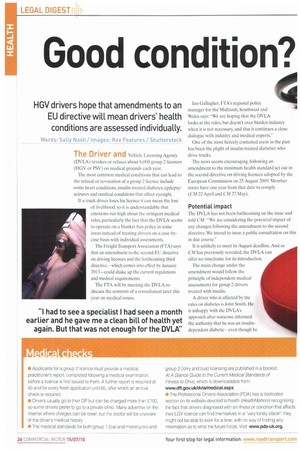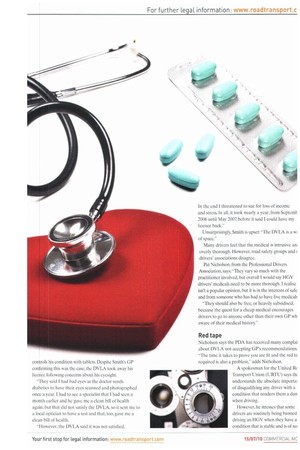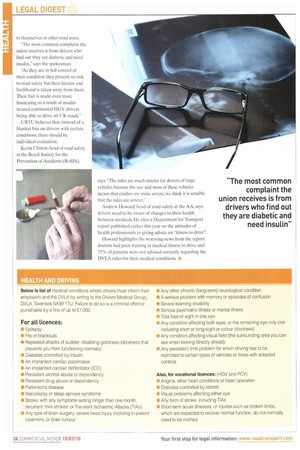Good condition?
Page 26

Page 27

Page 28

If you've noticed an error in this article please click here to report it so we can fix it.
HGV drivers hope that amendments to an EU directive will mean drivers' health conditions are assessed individually.
Words: Salty Nash / Images: Rex Features / Shutterstock The Driver and Vehicle Licensing Agency (DVLA) revokes or refuses about 6,000 group 2 licences (HGV or PSV) on medical grounds each year.
The most common medical conditions that can lead to the refusal or revocation of a group 2 licence include some heart conditions, insulin-treated diabetes, epilepsy/ seizures and medical conditions that affect eyesight.
If a truck driver loses his licence it can mean the loss of livelihood, so it is understandable that emotions run high about the stringent medical rules, particularly the fact that the DVLA seems to operate on a blanket ban policy in some areas instead of treating drivers on a case-bycase basis with individual assessments.
The Freight Transport Association (vrA) says that an amendment to the second EU directive on driving licences and the forthcoming third directive — which comes into effect by January 2013 —could shake up the current regulations and medical requirements The FTA will be meeting the DVLA to discuss the contents of a consultation later this year on medical issues. Ian Gallagher, ETA's regional policy manager for the Midlands, Southwest and Wales says: "We are hoping that the DVLA looks at the rules, but doesn't over-burden industry when it is not necessary, and that it continues a close dialogue with industry and medical experts."
One of the most fiercely contested areas in the past has been the plight of insulin-treated diabetics who drive trucks.
The news seems encouraging, following an amendment to the minimum health standard set out in the second directive on driving licences adopted by the European Commission on 25 August 2009. Member states have one year from that date to comply (CM 22 April and CM 27 May).
Potential impact The DVLA has not been forthcoming on the issue and told CM: "We are considering the potential impact of any changes following the amendment to the second directive. We intend to issue a public consultation on this in due course."
It is unlikely to meet its August deadline. And as CM has previously revealed, the DVLA can offer no timeframe for its introduction.
The main change under the amendment would follow the principle of independent medical assessments for group 2 drivers treated with insulin.
A driver who is affected by the rules on diabetes is John Smith. He is unhappy with the DVLAs approach after someone informed the authority that he was an insulindependent diabetic — even though he controls his condition with tablets. Despite Smith's GP confirming this was the case. the DVLA took away his licence following concerns about his eyesight.
They said I had had eyes as the doctor sends diabetics to have their eyes scanned and photographed once a year. I had to see a specialist that I had seen a month earlier and he gave me a clean bill of health again. but that did not satisfy the DVLA, so it sent me to a local Optician to have a test and that, too, gave me a clean bill of health.
"However, the DVLA said it was not satisfied. In the end I threatened to sue for loss of income and stress. In all, it took nearly a year, from Scptemh 2006 until May 2007, before it said I could have my licence back."
Unsurprisingly. Smith is upset: "The DVLA is a vc of space" Many drivers feel that the medical is intrusive an overly thorough. However, road safety groups and drivers' associations disagree.
Pat Nicholson. from the Professional Drivers Association, says: -They vary so much with the practitioner involved, but overall I would say HGV drivers' medicals need to be more thorough. I realise isn't a popular opinion, but it is in the interests of safe and from someone who has had to have five medicah "They should also be free, or heavily subsidised, because the quest for a cheap medical encourages drivers to go to anyone other than their own OP wh aware of their medical history.
Red tape Nicholson says the PDA has received many complai about DVLA not accepting GP's recommendations. "The time it takes to prove you are fit and the red ta required is also a problem,adds Nicholson.
A spokesman for the United Rt Transport Union (URTU) says ill.; understands the absolute importai of disqualifying any driver with a condition that renders them a dan when driving.
However, he stresses that some drivers are routinely being banned driving an HCiV when they have a condition that is stable and is of no to themselves or other road users, "The most common complaint the union receives is from drivers who find out they are diabetic and need insulin," says the spokesman.
"As they are in full control of their condition they present no risk to road safety but their licence and livelihood is taken away from them. Their ban is made even more frustrating as a result of insulintreated continental HGV drivers being able to drive on UK roads."
URTU believes that, instead of a blanket ban on drivers with certain conditions, there should be individual evaluation.
Kevin Clinton. head of road safety at the Royal Society for the Prevention of Accidents (RoSPa), says: "The rules are much stricter for drivers of large vehicles because the size and mass of these vehicles means that crashes are more severe: we think it is sensible that the rules are stricter."
Andrew Howard, head of road safety at the AA, says drivers need to be aware of changes to their health between medical& He cites a Department for Transport report published earlier this year on the attitudes of health professionals to giving advice on "fitness to drive". Howard highlights the worrying news from the report: doctors had poor training in medical fitness to drive and 75% of patients were not advised correctly regarding the DVLA rules for their medical conditions. el
































































































































